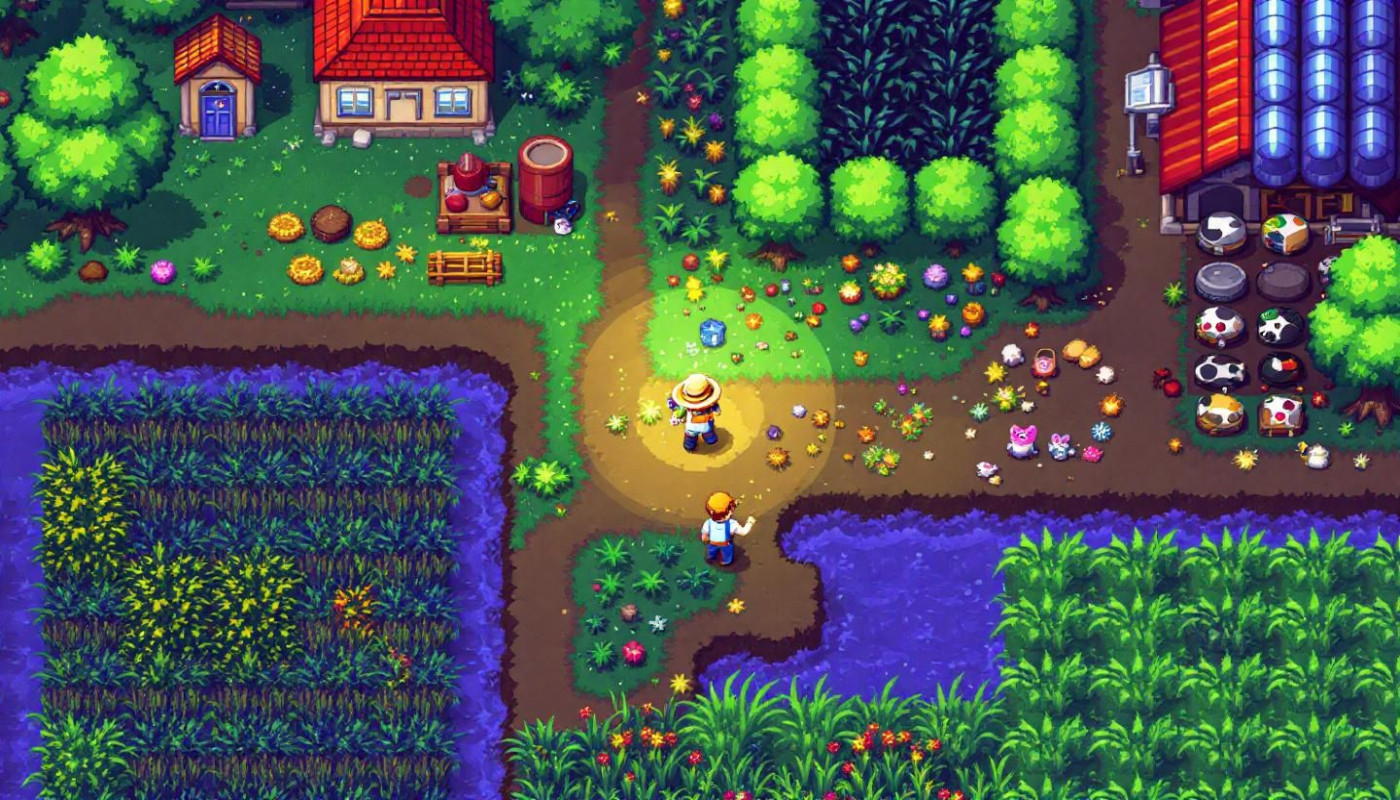Table of contents
Step into the unique world where gaming and farming themes converge, creating captivating experiences for enthusiasts of both realms. This blend offers a fresh perspective on virtual agriculture, combining the strategic elements of gaming with the immersive charm of rural life. Dive deeper to discover how this intersection fuels creativity, fosters community, and shapes innovative gameplay mechanics that continue to evolve.
Gaming dynamics meet agriculture
Farming games have evolved significantly by incorporating sophisticated game mechanics typically found in other simulation genre titles. Core elements such as resource management, progression systems, and achievement rewards are cleverly woven into the gameplay, transforming the act of tending virtual crops into a compelling experience. Resource management requires players to make strategic decisions about how to allocate time, energy, and currency while balancing short-term needs with long-term growth. Progression systems introduce new tools, crops, or areas as players advance, creating a satisfying sense of development. Achievement rewards, such as unlocking new features or cosmetic upgrades, add a layer of motivation, ensuring that each player’s journey feels unique and rewarding. Together, these game mechanics craft a robust game loop, where the satisfaction of planning, executing, and reaping in-game rewards keeps players invested and returning to their farms.
Many popular farming simulations feature mechanics reminiscent of other genres, such as timed harvesting, upgradeable equipment, and trading systems. These features maintain player engagement by offering continuous objectives and incentives for optimization, which are key for player retention. By gamifying agricultural tasks through these mechanics, farming games blur the line between leisure and strategy, fostering a community of dedicated players who appreciate depth and replayability. For a clear example of how a modern farming simulation integrates immersive game loops and dynamic player interaction, visit https://rabbit-road.game/. This adaptation of simulation principles demonstrates how the combination of familiar gaming frameworks with farming themes leads to a thriving and engaging virtual ecosystem.
Immersive worlds and storytelling
Farming games have evolved far beyond simple crop management, embracing immersive storytelling and sophisticated world-building strategies that captivate players. Through carefully crafted farming narratives, these games introduce interactive world elements where every object, location, and weather pattern can reveal bits of history or character backstory, employing the technique known as environmental storytelling. Character progression is deeply woven into the gameplay, with relationships, personal growth, and evolving story arcs directly influenced by the player's actions and choices. Players become emotionally invested as they watch characters grow, interact, and face challenges within complex story-driven gameplay. These narrative techniques not only draw players into the setting but also ensure long-term engagement, as the blend of dynamic world-building and meaningful storytelling keeps every new season in the game fresh and compelling.
Community and social connections
Multiplayer farming games have redefined the boundaries of social interaction in virtual spaces by integrating cooperative gameplay and persistent world environments. These experiences leverage robust online community features, allowing players to engage in cooperative farming endeavors, manage shared resources, and participate in trading systems that enhance both individual and group advancement. Such platforms offer virtual collaboration opportunities, where communal challenges and events require teamwork and strategic planning, fostering a sense of camaraderie among participants. The persistent world aspect means players’ actions have lasting effects, encouraging ongoing engagement and sustained relationships within the online community.
Through multiplayer farming mechanics, players can cultivate crops, raise livestock, and expand farms together, creating a dynamic where success is often contingent on effective communication and shared effort. Trading systems, both automated and player-driven, incentivize economic interaction and resource exchange, allowing for the emergence of player-driven marketplaces and specialized roles. Cooperative gameplay not only makes farming simulations more engaging but also helps individuals develop problem-solving, negotiation, and leadership skills in a relaxed, entertaining context.
Communal challenges—such as seasonal events, resource management contests, or collective infrastructure projects—stimulate social interaction by requiring coordinated contributions and strategy. These events are frequently designed to reward the entire online community, motivating players to collaborate and build lasting in-game relationships. Such experiences can help foster a welcoming, inclusive environment, making newcomers more likely to participate and forge friendships that extend beyond the game itself.
Despite these positive aspects, the social dynamics of multiplayer farming are not without challenges. Issues like inequitable resource distribution, in-game conflicts, or exclusion from communal activities can arise, potentially disrupting the sense of harmony within a persistent world. Effective moderation tools and well-designed cooperative gameplay systems are essential to maintaining a healthy, productive online community, ensuring that virtual collaboration remains rewarding for all participants. Developers must continually balance player autonomy with measures that prevent negative behaviors, creating a thriving space where everyone can enjoy the multifaceted benefits of multiplayer farming.
Educational impact and real-world influence
Farming games have emerged as powerful educational games, demonstrating how technology can foster experiential learning. By simulating tasks such as crop rotation, animal husbandry, and resource allocation, agriculture simulation games enable players to grasp the complexities of real-world farming while engaging in learning through play. These digital environments often mirror genuine agricultural cycles and challenges, providing nuanced insights into ecological balance and the responsibilities inherent in land stewardship. This virtual context allows participants to experiment with sustainable practices, understanding the impact of their choices without real-world consequences, which aligns closely with the growing focus on sustainability in gaming.
Through immersive gameplay mechanics, players develop practical knowledge about seasonal planting, soil management, and sustainable resource use. These elements are subtly woven into game progression, making educational content accessible and engaging. Educational game developers often collaborate with agricultural experts to ensure that in-game information about crop varieties, irrigation techniques, and environmental impacts is both accurate and informative. Players become more aware of the delicate balance between productivity and environmental care, gaining insights into sustainability in gaming that have real-world applications beyond the screen.
Interest sparked by agriculture simulation games frequently extends beyond entertainment, inspiring players to explore real-world farming or environmental advocacy. The captivating nature of experiential learning encourages participants to seek out community gardens, volunteer opportunities, or further education in environmental science. In sum, the seamless integration of educational themes within these games demonstrates how digital platforms can foster a new generation of environmentally conscious individuals, bridging the gap between virtual experiences and tangible, positive impact on agricultural practices and sustainability.
Innovation and future trends
The landscape of farming-themed games is undergoing rapid transformation as gaming innovation drives new experiences for players. Virtual reality farming is emerging as a dynamic way to immerse players in the agricultural world, offering lifelike environments and interactive tools that mimic real-world farming practices. Another significant advancement is the integration of mobile devices, enabling cross-platform play and persistent worlds that can be managed on the go. At the same time, procedural generation is allowing developers to create endlessly varied landscapes and farming scenarios, ensuring that each player's experience is unique and replayable. These next-gen gameplay features are setting new benchmarks for user engagement and realism in the future of simulation games.
Looking ahead, the future of simulation games in the farming genre will likely be influenced by continued advancements in artificial intelligence, cloud computing, and social connectivity. Player expectations are shifting toward deeper customization, more complex ecosystems, and real-time collaboration, all facilitated by technological progress. Challenges remain in balancing accessibility with realism and ensuring that new technology does not alienate less tech-savvy audiences. Opportunities abound for studios willing to experiment with emergent technologies and community-driven features, suggesting a vibrant and evolving future for both gaming innovation and player-driven content in farming simulations.
Similar

Understanding Certified Algorithms In Online Casino Games

Comparing Payment Methods At Top Online Gaming Platforms?

Exploring The Allure Of Casinos Outside Regulatory Networks

Exploring The Evolution From Classic To Modern Casino Games

User Experiences In Modern Online Casino Gaming Platforms

How To Manage Your Budget Effectively While Playing Online Plinko Games

Exploring The Evolution And Strategy Of Minesweeper-style Casino Games

Discover The Variety Of Games Available In Online Casinos

Understanding The Rules And Gameplay Of Chicken-themed Gambling Games

Exploring The Latest Trends In Online Streaming Entertainment Platforms

Exploring The Benefits Of Provably Fair Technology In Online Gaming

Exploring The Impact Of Traditional Japanese Practices On Modern Lifestyles

Mastering Different Difficulty Levels In Road Crossing Contests

Strategies To Maximize Winning Potential In Mythical-themed Slots

Understanding The Appeal Of Generous Casino Bonuses And Promotions

Ensuring Safety And Security When Gambling Online

How To Maximize Your Winnings In Crash Games Using Statistical Data

Exploring The Popularity Of Themed Online Slot Games

Top Benefits Of Using Asian Sportsbooks For Betting

Exploring The Impact Of Grassroots Initiatives On Football Development

Strategies To Maximize Winnings In Major African Football Tournaments

The Evolution Of Plinko: From TV Game Show To Online Casino Phenomenon

Exploring The Impact Of Welcome Bonuses On Player Loyalty At Online Casinos

Betting on Virtual Reality: The Future of Gambling

